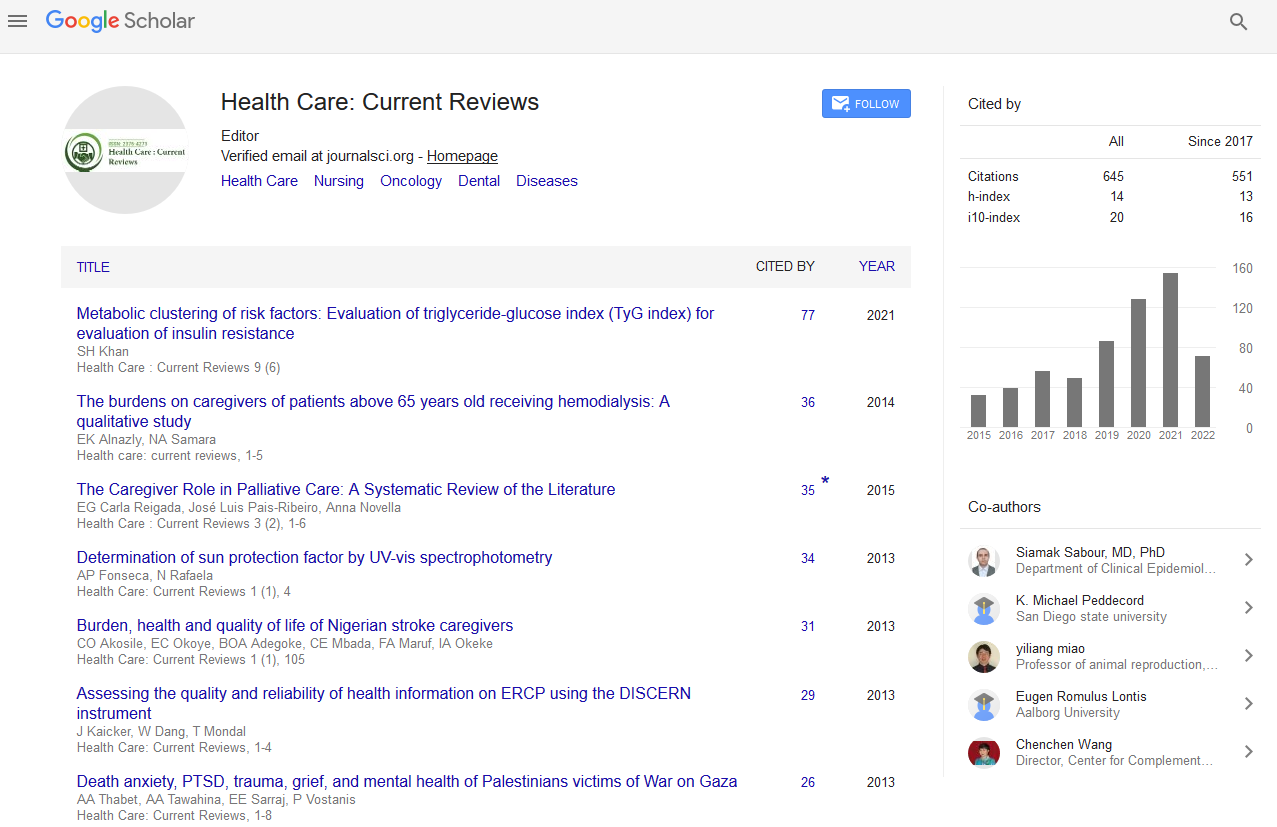PMC/PubMed Indexed Articles
Indexed In
- Open J Gate
- Academic Keys
- RefSeek
- Hamdard University
- EBSCO A-Z
- Publons
- Geneva Foundation for Medical Education and Research
- Google Scholar
Useful Links
Share This Page
Journal Flyer

Open Access Journals
- Agri and Aquaculture
- Biochemistry
- Bioinformatics & Systems Biology
- Business & Management
- Chemistry
- Clinical Sciences
- Engineering
- Food & Nutrition
- General Science
- Genetics & Molecular Biology
- Immunology & Microbiology
- Medical Sciences
- Neuroscience & Psychology
- Nursing & Health Care
- Pharmaceutical Sciences
Safety, efficacy and mechanism of action of fasd (bloodletting through venesection) in the cases of osteoarthrosis: A controlled clinical study
3rd Indo-Global Summit & Expo on Healthcare
October 05-07, 2015 New Delhi, India
Shariq Ali Khan, Shagufta Rehman, S S Jamil and S M Abbas Zaidi
Central Council for Research in Unani Medicine, India Jamia Hamdard, India Hakim Syed Ziaul Hasan Government Unani Medical College & Hospital, India
Scientific Tracks Abstracts: Health Care: Current Reviews
Abstract:
Osteoarthrosis is the commonest life style disorder encountered by the society. In the western countries radiographic evidences of this disease is present in majority of persons by 65 years of age and about 80% persons more than 75 years of age; despite exhaustive work, still no satisfactory answer has been placed forward by the modern medicine, conservative measures are ineffective and produce various ADRs. Whereas, the Unani physicians e.g., Galen, Ibn Sina, Razi, Majoosi, Akbar Arzani, Azam Khan & Kabiruddin has suggested Fasd as an adjuvent regimental therapy for various types of Arthritis. Though venesection is in vogue but its scientific validation has not been carried out so far about its safety, efficacy and mechanism of action. Therefore, to explore new alternatives and for scientific validation of Fasd, this study has been designed and carried out to evaluate the safety and efficacy and to explore the mechanism of action of Fasd in the cases of Osteoarthrosis. Total 40 cases of O.A. was randomly divided into two groups A & B (20 each). Group �??A�?? (Control group) was administered with the standard drugs while Group �??B�?? (Test group) was given the standard drugs as given in group �??A�?? with intervention of venesection. The duration of treatment was fixed 6 weeks. The intervention of Fasd was performed at base line, 14th & 28th day. The pathological, biochemical (LFT, KFT) arthritic profile and radiological examination was performed at base line and last follow up. The intervention Fasd (Venesection) showed statistically significant results in comparison to control group in subsidence of pain, morning stiffness and muscular weakness but comparable in swelling/effusion and restriction of movement. The test intervention was found safe and well tolerated as evaluated on hematological parameters (Hb, TLC, DLC & ESR), LFTs & KFTs. The communiqué also brings into limelight the possible mechanism of action of Fasd in O.A. by exploiting the knowledge of microcirculation, Hemodynamics and physical and chemical dimensions of Bio-hemorheology.
Biography :
Shariq Ali Khan is a graduate in Bio Science (BSc) from Agra University, graduate in Medicine (BUMS), Gold Medalist from University of Delhi, Post graduate (MD) (Medicine-Unani) from Hamdard University, New Delhi, Long Term Training Fellow (ICMR-NIH USA) on Bioethics and Associated Expert on Bioethics for BBB University of DUQUESNE, USA, PGDBE (Bioethics) from IGNOU, New Delhi. He is having 30 years of experience in Applied Clinical Research, besides 07 years experience of Teaching as Faculty. He is presently working as Scientist-IV in CCRUM, Ministry of Health & F.W; Government of India and has published two books and twenty research papers in different national and international journals and presented more than 50 papers in different national and international conferences.
Email: drshariqakhan@gmail.com


